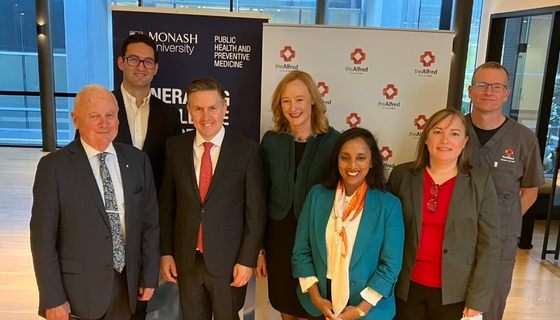
Heart Foundation NSW Election Statement
Media release: 6 March, 2023
More action needed to protect young people from heart disease
The Heart Foundation is calling on all NSW parties to support the installation of more life-saving Automated External Defibrillators (AEDs) in public places and some emergency services vehicles, and to also pledge stronger support for regulation around e-cigarettes and junk food advertising in a bid to lower the risk of young New South Wales residents acquiring heart disease or other chronic conditions later in life.
In its election statement released today, the Heart Foundation is calling on all parties to:
Support a push for life saving AEDs to be installed in more places
- Mandate the installation and maintenance of AEDs in large commercial buildings.
- Fund the purchase and installation of AEDs in all publicly owned or contracted transport vehicles including buses, trains and light rail.
- Fund the purchase and installation of AEDs in all publicly owned or managed buildings and state-owned corporations.
- Expand the existing program to fund the purchase of AEDs for sporting organisations to ensure that every sporting facility in New South Wales has an AED accessible to the public.
- Work with the emergency services to increase the number of AEDs in non-ambulance first responders (police, fire, State Emergency Service).
Heart Foundation NSW General Manager, Simon Cowie, said that out-of-hospital cardiac arrests (OHCA) are a significant public health issue in New South Wales.
“Each year in New South Wales, more than 8,500 people experience an out-of-hospital cardiac arrest (OHCA)5, and survival rates for OHCA remain low, with only 12% of cases surviving to discharge from hospital,” he said.
“For every minute a patient is in cardiac arrest, not receiving cardiopulmonary resuscitation (CPR) or AED shock, chances of survival drop by 10%6.”
Sudden cardiac arrest can strike anywhere, anytime, and is often fatal without immediate and appropriate intervention from bystanders. That intervention includes the use of an AED. The condition affects 20,000 Australians each year, and the outcomes are grim: 90 percent of people who suffer a sudden cardiac arrest will die, 2,000 of them under the age of 50.
“Ensuring that people can access AEDs when they need it will save lives in New South Wales,” Mr Cowie said.
“Having AEDs accessible in the event of an emergency means that they can be used prior to the arrival of paramedics, greatly increasing the chances of survival for someone who is suffering a cardiac arrest."
The Heart Foundation is also calling on all parties to commit to supporting the following initiatives to protect young people:
Protecting young people from the harmful effects of nicotine addiction
- Make it an offence to sell or supply non-nicotine e-cigarette products.
- Increase the number of New South Wales Health inspector compliance visits to retailers selling tobacco and e-cigarette products.
- Increase the penalties for retailers illegally selling e-cigarette products.
- Introduce a positive retail licensing scheme for tobacco and e-cigarette vendors and limit the number of retail outlets permitted to sell tobacco and e-cigarettes.
Removing the advertising of unhealthy foods from state-owned property
- The Heart Foundation is calling on the government of New South Wales to remove all advertising of unhealthy food and drink on publicly owned or contracted assets, starting with public transport.
- The advertising of unhealthy foods on public transport reaches a significant number of young people every day, substantially influencing their food choices and eating habits. On average, children are seeing more than seven adverts for unhealthy food on each trip to school1.
Mr Cowie said young people faced big challenges in managing their heart health despite advances in heart science and medicine.
“A combination of sedentary lifestyles and cunning marketing from junk food companies in public places and on social media is causing younger people to adopt poor nutrition and exercise habits that could prove costly later in life,” Mr Cowie said.
Heart Foundation funded researcher and one of the nation’s leading experts on junk food advertising, Professor Kathryn Backholer, said children should be able to travel to and from school without being bombarded by junk food advertising.
“This kind of advertising is at odds with the health and well-being responsibilities that state governments around the country have,” Ms Backholer said.
"Every exposure to junk food advertising - irrespective of the medium, whether it be online or at a bus shelter - just reinforces the next exposure.
“As children live, play and learn, they are inundated by routine exposure to things like unwholesome food or drink which negatively influences attitudes and behaviour, and therefore cardiovascular health and wellbeing.”
What is an Automated External Defibrillator (AED)?
- An AED is a light-weight, battery operated, portable device and is used to deliver a shock to help restore normal heart rhythm following a cardiac arrest.
- Anyone can use an AED, regardless of whether they have received training to do so.
- If someone is in cardiac arrest and an AED is available, simply open it and follow the verbal instructions.
- An automated external defibrillator (AED) will only give a shock if it is necessary
- You may have already seen AEDs in places you visit every day, including shopping centres, sporting clubs, gyms, or your workplace.
- AEDs are designed to be stored for long periods without use and require very little maintenance.
References
- https://www.ourkidsourcall.com.au/
- https://www.healthstats.nsw.gov.au/#/topic-overview/Overweight%20and%20obesity
- https://www.healthstats.nsw.gov.au/#/topic-overview/Smoking
- https://www.healthstats.nsw.gov.au/#/indicator?name=-beh-smo-ecig-phs&location=NSW&view=Trend&measure=prevalence&groups=Electronic%20cigarette%20use&filter=Electronic%20cigarette%20use,Current%20user,Ever%20used
- https://www.health.nsw.gov.au/cardiacarrest/Pages/consumers.aspx
- https://restartaheart.net/
- https://www.baker.edu.au/news/in-the-media/improving-sca-survival
You might also be interested in...

Heart Foundation congratulates Federal Government on $33.6 million to heart health of Australians
The Heart Foundation is today congratulating the Federal Government for providing $33.6 million in funding for 41 vital cardiovascular research projects via the Medical Research Future Fund (MRFF).

Heart Foundation welcomes new tobacco reform measures to address e-cigarette and vaping products
The Heart Foundation welcomes the Commonwealth Government’s renewed focus on tobacco control as well as its undertaking to consult on how regulatory shortcomings have allowed for a proliferation of vapes and e-cigarettes.

Heart Foundation launches ‘Lunchbox Lifesaver’ tips for a healthy return to school
Heart Foundation launches ‘Lunchbox Lifesaver’ tips for a healthy return to school
Last updated26 February 2024
